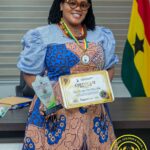The National Peace Council (NPC), in partnership with the Catholic Relief Services (CRS), has rallied youth, women and opinion leaders in the Biu community of the Kassena-Nankana Municipality, to build resilience against violent extremism and strengthen trust with security agencies.
The engagement formed part of the Prevention of Violent Extremism Through Social Accountability II (PoVETSA II) Project, aimed at preventing violent extremism and fostering social cohesion in northern Ghana by building trust between civilians and security forces.
The project, funded by the Netherlands Ministry of Foreign Affairs, also focused on promoting inclusivity, addressing root causes such as corruption and negative stereotypes, and supporting the revision of national counter-extremism frameworks.
Mrs Janet Sarney Kuma, Director for Capacity Development and Outreach at the NPC, addressing the participants, described the dialogue as a “critical platform” for collective action to protect Ghana’s peace.
“Violent extremism and terrorism pose serious threats not only to our national security but also to the peace and development of our families and communities. While Ghana has remained a beacon of stability in the sub-region, we cannot take this peace for granted,” she said.
She underscored the project’s emphasis on inclusivity, stressing that women, youth, persons with disabilities, and Fulbe groups must all be part of the peacebuilding process.
Mr Damien Asobayire, the Executive Secretary of the Upper East Regional Peace Council, explained that Biu’s vulnerability as a border community and its history of unresolved conflicts made it a priority for intervention.
“Unresolved conflicts in communities become openings for violent extremists to exploit. Biu has experienced tensions linked to chieftaincy and clan disagreements, so it was necessary to bring this programme here to build resilience and trust,” he noted.
He urged civilians and security services to forge stronger collaboration to ensure lasting peace, adding that similar dialogues would soon be held in Kologu and other neighbouring communities.
ASP Jamal A. Boah, Crime Officer at the Kassena-Nankana Municipal Police Command, indicated that security was a shared responsibility and that civilians had a crucial role to play by reporting suspicious characters and collaborating with security agencies to combat crime.
Deputy Superintendent of Immigration (DSI) Jarry K. Attipoe, Officer in charge at the Navrongo office of the Ghana Immigration Service, said all they needed from the community was their support to secure the borders and urged them to report whenever they saw suspicious characters.
Mr Moses Abinab, the Assembly Member for the Bipo-Naba Electoral Area, described the dialogue as “very fruitful” and appealed for continued support to sustain peacebuilding initiatives in the area.
Mrs Rosina Talata Akanligri, a women’s leader, emphasised the disproportionate impact of conflict on women and children.
“If there is conflict in this community, we, the women and children, suffer the most. This dialogue has educated us, and as women’s groups we can now meet, talk to each other, and help calm tensions,” she said.
Mr Ali Anankpieng, Peace and Conflict Resolution Consultant and facilitator of the dialogue, noted that the growing mistrust between civilians and security agencies in Ghana was eroding cooperation and creating tension.
He highlighted that both groups have been victims of violence, citing for instance that between 2017 and 2021, 55 police officers died on duty, while 72 civilians died and 120 were injured at the hands of police or military personnel in 2017.
He emphasized that the persistence of unresolved internal conflicts in Northern Ghana, many of which have historical roots tied to colonial policies, could be flag gates for violence if not addressed, and charged both the security services and civilians to cooperate in handling security matters in the community.
GNA


















